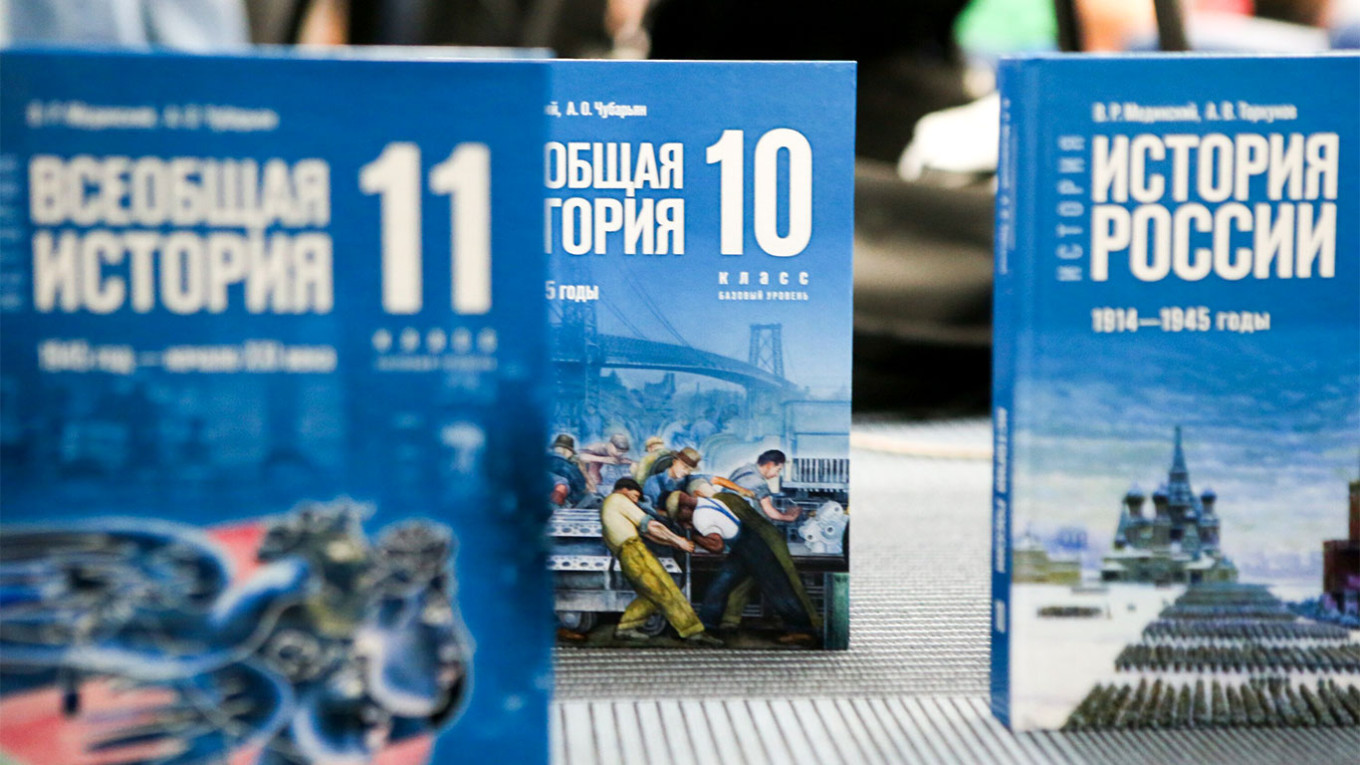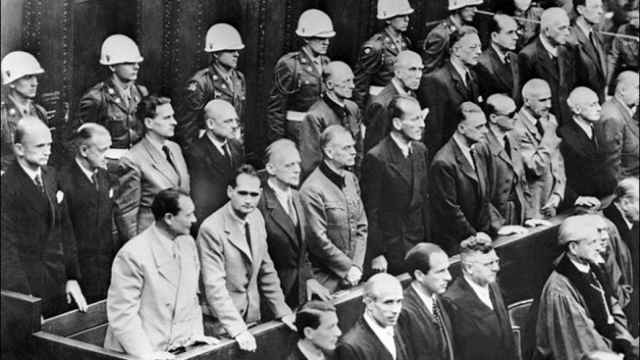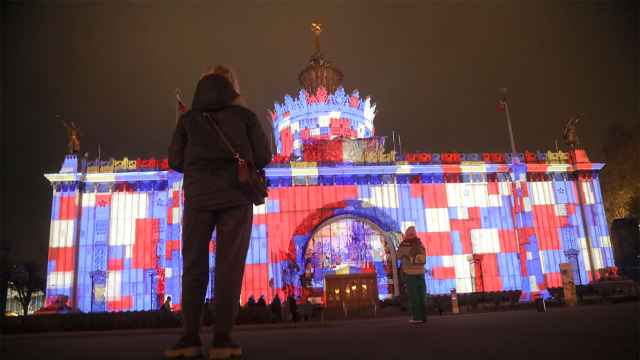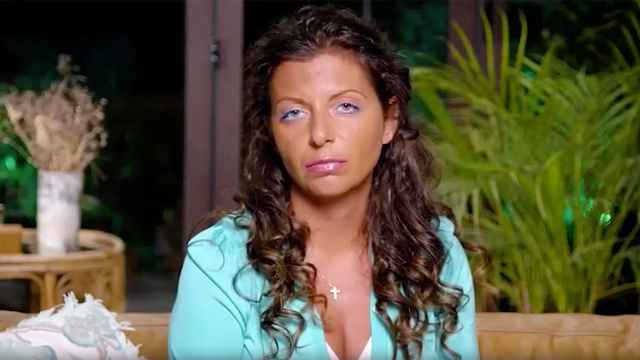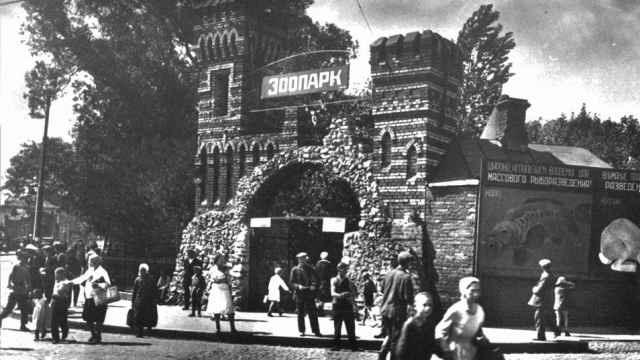“Knowledge of history allows you to not only evaluate past events but also to divine the future.”
This is the pontifical claim at the close of a new, highly partial, Russian school history textbook for years 10-11. Covering the post-war period to the present day, the “History of Russia” coursebook is not concerned with evaluating the past or with training students to apply history critically to understand global processes. Instead, it seeks to impose a view of Russian history with the goal of shaping expectations for the future.
Despite the furor around the textbook, its contents are not unusual when viewed against the Kremlin’s ongoing obsession with drawing from a re-imagined past in order to assert political legitimacy in the present. It portrays Russian history post-1945 as that of an innately great and special power betrayed by those it helped — eastern Europe and former Soviet republics — and under constant assault from the West and its collaborators inside Russia.
Ukraine haunts the coursebook. The first full page of text refers to the banderivtsy, a term used to describe followers of the Ukrainian nationalist and fascist, Stepan Bandera. However, since 2014, Russian propaganda has expanded the term’s use to label almost anyone who supports Ukraine as an independent nation. A sub-chapter blames Ukrainian nationalism for the high crime rates in the late 1940s. Another brief segment, centered on the wartime deportation of entire nations to Siberia and Central Asia, mentions only the Crimean Tatars by name. It explains that despite their collaboration with the Nazis, Soviet authorities put in every effort to make their “resettlement” as humane as possible.
Here and elsewhere, the textbook relies on omissions and outright lies to make its case. Stalin’s post-WWII “anti-cosmopolitan campaign” is summarized in terms suspiciously well-suited to describing Putin’s denigration of so-called “foreign agents.” There is no mention of the antisemitic nature of the campaign, nor the antisemitism behind the later “doctor’s plot” — allegations that prominent medical specialists intended to murder leading government and party officials.
At the same time, the Soviet Union’s post-war occupation of Eastern Europe becomes a defense of “people’s democracies” against American imperialism. The Brezhnev era of stagnation is reframed as a “welfare revolution.” Glasnost’ was not a concession to popular demands for freedom of speech, or driven by the failure of Soviet propaganda to win its battle against reality. Instead, it was a foolish move that paved the way for the Western ideological indoctrination of the Soviet people and ultimately destroyed the U.S.S.R.
After reading the full text, one can only conclude that there were no dissidents in the Soviet Union, only Western agents, Western dupes, and Ukrainian — or sometimes Baltic — cryptofascists.
Vladimir Medinsky, the former PR man for the infamous MMM ponzi scheme, is responsible for overseeing and writing large chunks of the text. In his past role as Minister of Culture, he spearheaded the use of patriotic memory campaigns as a form of defense against Western influence on the Russian public. He currently serves as a presidential aide on matters of memory and history and is widely rumored to have written Putin’s infamous 2021 essay on the historical unity of Russians and Ukrainians.
The textbook carries all the hallmarks of Medinsky’s vast oeuvre, especially his “Myths About Russia” book and television series, which insists that enduring stereotypes about Russians as heavy drinkers or favoring cruel authoritarian leaders are the result of centuries-old Western disinformation campaigns, designed to shame Russians.
Clearly, Medinsky sees the new textbook as an important corrective and defensive weapon against Western cognitive warfare on Russian identity and historical memory. Consequently, it is a tad ironic that the Russian people — confusingly conflated with the Soviet people at many points — are blamed for the few Soviet “excesses” that do feature in the book. The deportations of “collaborator” nations apparently occurred because public opinion demanded it. Likewise, many Soviet citizens who had the misfortune to end up as forced laborers under the Nazis or who lived in Nazi-occupied territories were sent to the Gulag because that is what society wanted.
So, while the patriotic message of the textbook might initially evoke a sense of inspiration — you are the heirs to a truly heroic and magnanimous nation — beneath the surface is an altogether more menacing argument: you cannot separate yourself from the state’s crimes; they are also your crimes, uniting us in the present just as they did in the past.
The intended reader is constantly made part of the Soviet people’s triumphs and the injustices they endured, achieved through the textbook’s personalized content and constant references to the present. Descriptions of the post-war erection of Red Army monuments dwell on their present-day removal by Poles, Ukrainians and others. The reader is assigned responsibility for defending the memory of Soviet exploits and the book concludes by calling the reader to do just that — for their own sake, but for Russia’s future as well.
This is a departure from earlier textbooks, which adopted a more restrained tone. Moreover, whole sections from the 1970s to the present-day have been rewritten to align with a post-revisionist view of the Soviet collapse as part of an ongoing Western war against the “historic essence” of the Russian nation.
The book also has the dubious marker of being the first “universal textbook” since 1991 — normally, teachers would have a choice of several books developed in accordance with cultural-historical standards. The man responsible for creating these standards is Sergei Naryshkin, the head of the Russian Historical Society and the Russian Foreign Intelligence Service.
Despite these changes, the textbook is far from a revolution in Russian historiography. Many of its core assertions align with well-established and mainstream views in Russian society, media, and popular culture. This should hardly be surprising given the aggressive manner in which the Kremlin has propagated its memory politics and prosecuted those who have dared to express dissent over the past two decades. The arguments presented in the textbook owe their existence to the 2009 presidential commission on historical falsification, the criminal charges brought against Russian citizens who stated the truth about Soviet atrocities, and notably, the degradation of the Great Patriotic War’s sacred memory into a tool of propaganda aimed at fomenting hatred against Ukrainians.
Since Russia’s full-scale invasion of Ukraine, the importance and instrumentalization of memory politics have only risen. Russian schools have introduced new classes that promote traditional and patriotic Russian values, as defined by the Kremlin. In the last year, over 1.5 million military-patriotic events have been organized, twice as many as the year before. At the university level, the state has demanded the restructuring of history courses to reflect its political priorities and introduced a nationwide course entitled “Foundations of Russian Statehood,” which illuminates the exceptionalism of the Russian nation.
The fervor for historically falsified patriotic education shows little sign of abating — a new “universal” history textbook for years 5-6 is already in the works. Its primary aim will be to distinguish “good” Russian imperialism from “bad” British and other European imperialisms.
The Kremlin’s ongoing patriotic memory campaigns will have a lasting impact on collective and cultural representations of the past. But more importantly still, they will shape how future Russian generations understand their country’s war against Ukraine, Moscow’s conflict with the West and the persecution of dissidents at home.
Russia’s rewriting of the past is really about refining societal perceptions of the present, fusing and subjugating the needs of the Russian people to those of the state, and providing pre-explanations for the challenges Russian society will face and the war crimes Russia will commit. This isn’t a history textbook, but a narrative of excuses for Russian and Soviet crimes, as well as an exhortation to young readers to accept these crimes — past and present — as their own.
A Message from The Moscow Times:
Dear readers,
We are facing unprecedented challenges. Russia's Prosecutor General's Office has designated The Moscow Times as an "undesirable" organization, criminalizing our work and putting our staff at risk of prosecution. This follows our earlier unjust labeling as a "foreign agent."
These actions are direct attempts to silence independent journalism in Russia. The authorities claim our work "discredits the decisions of the Russian leadership." We see things differently: we strive to provide accurate, unbiased reporting on Russia.
We, the journalists of The Moscow Times, refuse to be silenced. But to continue our work, we need your help.
Your support, no matter how small, makes a world of difference. If you can, please support us monthly starting from just $2. It's quick to set up, and every contribution makes a significant impact.
By supporting The Moscow Times, you're defending open, independent journalism in the face of repression. Thank you for standing with us.
Remind me later.



